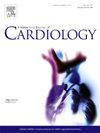Interpretable hybrid-ensemble acute myocardial infarction diagnosis with clinical transparency
IF 3.2
2区 医学
Q2 CARDIAC & CARDIOVASCULAR SYSTEMS
引用次数: 0
Abstract
Background
Single-algorithm machine learning models for acute myocardial infarction (AMI) often struggle with heterogeneous clinical data and lack transparency, limiting their clinical adoption.
Methods
We propose a novel interpretable hybrid-ensemble AMI diagnosis method with clinical transparency. Our method performs nested iteration and global hyperparameter optimization via data reuse, which can improve the generalizability of single-algorithms to a certain extent. By balance criterion between ensemble robustness and performance optimization, some improved pre-ensemble algorithms and optimal ensemble strategy are determined to coordinate multiple algorithms in constructing our hybrid-ensemble model. A game-theoretic marginal contribution analysis (GMCA) framework was established to quantify the feature contribution of prediction results in global and local levels,which can improve the interpretability and clinical transparency of our hybrid-ensemble model. Based on the framework, data-driven dimensionality reduction of clinical feature is performed, while ensuring clinical effectiveness through expert guided validation. Additionally, a series of extended experiments were conducted to further validate the adaptability and generalizability of our proposed method.
Results
Our hybrid-ensemble model achieved 0.944 accuracy and 0.94 F1-score in binary classification, outperforming single-algorithms. The GMCA framework identified six features, achieving dual optimization of data-driven selection and domain knowledge consistency. Extended experiments confirm the model's robust accuracy and generalizability across diverse configurations.
Conclusions
Our study presents a replicable method for developing transparent and clinically actionable AI systems in emergency cardiology. By harmonizing algorithmic diversity with interpretability, our hybrid-ensemble method not only enhances diagnostic accuracy but also fosters clinician trust.

可解释的混合集合急性心肌梗死诊断与临床透明度。
背景:急性心肌梗死(AMI)的单算法机器学习模型经常与异构的临床数据作斗争,缺乏透明度,限制了其临床应用。方法:我们提出一种新的可解释的混合集合AMI诊断方法,具有临床透明度。该方法通过数据重用实现嵌套迭代和全局超参数优化,在一定程度上提高了单算法的泛化能力。根据集成鲁棒性和性能优化的平衡准则,确定了一些改进的预集成算法和最优集成策略,以协调多种算法构建混合集成模型。建立博弈论边际贡献分析(GMCA)框架,量化预测结果在全球和局部水平的特征贡献,从而提高混合集成模型的可解释性和临床透明度。在该框架的基础上,对临床特征进行数据驱动的降维,同时通过专家引导的验证确保临床有效性。此外,还进行了一系列扩展实验,进一步验证了该方法的适应性和泛化性。结果:我们的混合集成模型在二元分类中准确率达到0.944,得分为0.94 f1,优于单一算法。GMCA框架确定了六个特征,实现了数据驱动选择和领域知识一致性的双重优化。扩展实验证实了该模型的鲁棒准确性和在不同配置下的泛化性。结论:我们的研究提出了一种可复制的方法,用于开发急诊心脏病学中透明且临床可操作的人工智能系统。通过协调算法多样性和可解释性,我们的混合集成方法不仅提高了诊断准确性,而且还培养了临床医生的信任。
本文章由计算机程序翻译,如有差异,请以英文原文为准。
求助全文
约1分钟内获得全文
求助全文
来源期刊

International journal of cardiology
医学-心血管系统
CiteScore
6.80
自引率
5.70%
发文量
758
审稿时长
44 days
期刊介绍:
The International Journal of Cardiology is devoted to cardiology in the broadest sense. Both basic research and clinical papers can be submitted. The journal serves the interest of both practicing clinicians and researchers.
In addition to original papers, we are launching a range of new manuscript types, including Consensus and Position Papers, Systematic Reviews, Meta-analyses, and Short communications. Case reports are no longer acceptable. Controversial techniques, issues on health policy and social medicine are discussed and serve as useful tools for encouraging debate.
 求助内容:
求助内容: 应助结果提醒方式:
应助结果提醒方式:


